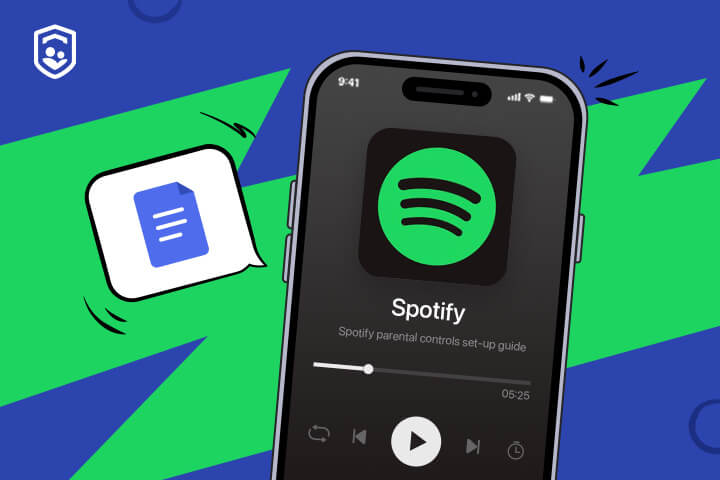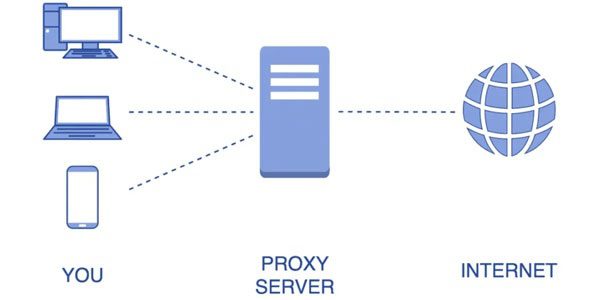Have you ever tried to listen to your favorite songs on Spotify during school hours and it did not work? If yes, then do not worry you are not the only one. Many schools restrict access to Spotify as they want to boost their students’ concentration levels and ensure safety while surfing the web. In this writing, we will elaborate on how and why Spotify is blocked at school. In addition, we will offer you more parental gudiance tips. Therefore, make sure to read until the end.
Why is Spotify blocked at school?
In case Spotify is off-limits during school hours, there is no need to worry. Schools have raised restrictions for a purpose. Let’s explore the reasoning behind this!
To center kids’ attention toward studying: Too many people think that Spotify is harmless. But just like every coin has two sides. Schools periodically limit access to websites/apps like Spotify because students can get sidetracked. This ensures that students are more focused on academic activities.
Bandwidth management in schools: Various online entertainment activities consume public bandwidth in schools. Blocking certain online services is a way to ensure a stable school network connection. Everyone at school doing their lessons and studies at the same time may lead to Wi-Fi disruption problems.
Part of the rules for blocking content: While schools do allow the use of Spotify, they have blocked TikTok, Instagram, and Netflix, even banning phone use. In fact, over nine out of ten schools throughout the world have very stringent restrictions when it comes to internet access. These actions ensure that students are able to concentrate and be active participants during class.
Parental controls and monitoring help safeguard your kids all-round and ensure online balance.
How do schools block non-essential websites like Spotify?
Schools use network filters to block non-essential websites like Spotify. Let me break it down for you so you understand it better.
- How do network filters operate?
When trying to log into a school-provided Wi-Fi through your personal laptop, phone, or tablet. You are practically sending a note to the internet asking for permission to access specific websites or apps.
As already mentioned, network filters operate within the bounds of the school as well. This particular software examines every single request that you send. Any request containing certain sites or apps, such as Spotify, categorized under entertainment, gets blocked at school. You can compare it to a security guard or digital gatekeeper who looks after students while they are online.
Some network filters block the network if the description or the URL of the page contains certain keywords. For instance, the phrases “games”, “social media,” and “music streaming” can easily ring an alarm. Hence, these websites remain unallocated.
- Why do they need online filtering?
Restrictions on some websites and apps like Spotify help keep you online safe and focused. Remember! Some unknown platforms contain identity theft issues, virulent material, or sites that can harm the PC or phone. The lack of filters can be hostile.
Last but not least, this is to make sure that every person can access the web at high speed. The use of Spotify and other apps takes a large chunk of data, so significant limits can be set on the school internet.
Is Spotify safe for school kids?
Do you think Spotify is appropriate for kids and should not be blocked at school? Well! While Spotify offers a diverse selection of music and podcasts, it is not age-appropriate for everyone. Let us further analyze this issue and see what specialists suggest regarding children’s safety on such platforms.



- Spotify age limit:
To use Spotify, you must be at least 13 years old. If you are under 13 you cannot register an account, and parental controls should be set up to prevent children from viewing everything on Spotify.
However, some playlists contain bad language and sexually suggestive content, which increases concerns. In fact, according to some survey reports, 88% of parents have concerns with their kids’ usage of platforms like Spotify.
Why it might not be safe for school kids
On the other hand, the Spotify side has problems that are most difficult with explicit songs. You can easily assume that placing an ‘E’ on explicit songs means the listener will not encounter such information during listening. Such songs are still in the library of Spotify and if you do nothing, that information is freely available.
Ads have their own issues as well. Ads will interrupt a song in the middle of a set schedule for the free version. Research shows that nearly 30% of digital ads are not age-appropriate. So you get exposed to something within a certain range that is not fit for you.
Why is Spotify censoring words?
So, did you ever realize that while listening to some songs on Spotify, some lyrics are removed or muted? This is so because Spotify removes some lyrics to make your music experience “safer”. Let me explain why and how this happens.
Spotify started concentrating on inappropriate songs, which is why it puts ‘E’ labeling on songs. This mechanism will inform users about the exact type of the song before it’s played.
For children or family-oriented playlists, offensive language is wiped out or paraphrased in Spotify’s proprietary playlists. It offers an enhanced experience through content filtering and guarantees peace while listening to music feel free to relax with the selected playlist at your discretion.
How can students access blocked Spotify at school?
Sure, students can unblock Spotify restrictions in schools. It is necessary to understand these means. This helps you guide children to properly view the school’s Internet restriction policy and rationalize their Internet activities. Now, let us start examining how to obtain access to Spotify even if it is blocked at school.
i) Using a VPN
People can always bypass certain online restrictions using VPN accelerators. VPNs are also among the easiest and safest methods to use when you want to increase the level of security around your device while online.
It also shields your IP address and Geolocation. Therefore, the school’s network will not be able to scrutinize the exact location you are accessing the information. This certainly helps in overcoming the caps set.
ii) Using a proxy website
A proxy acts as a channel between your device and the internet. So when you activate a proxy, it goes to the page and retrieves it for you. This may assist in surpassing limitations because instead of the prohibited website, the proxy is what the school’s network perceives.



iii) Switching to mobile data
If you can’t access Spotify on the school network, there is a possibility that Wi-Fi restrictions exist. So, you can try switching on mobile data. In this manner, you can connect your phone to your computer and escape the confinement of the school’s Wi-Fi.
iv) Using browser extensions
Browser extensions, such as Hola VPN or TunnelBear, assist in evading network restrictions or altering an IP address. These applications may be able to unblock services like Spotify by changing your Internet connection settings.
v) Modifying DNS preferences
You can opt to configure your DNS settings by using a public DNS service such as Google DNS or Open DNS. Sometimes, these providers can help with evading some network limits by using other paths to the Internet.
Despite the above ways, parents need to teach their children that rather than trying to avoid boundaries, they must try redirecting their focus away from such aspects and adjusting schedules. Moderation is key in everything and that includes fun balanced with concentration.
Bonus solutions for making Spotify safe and fun for kids
Instead of strictly banning music platforms, we should bring all-round protection and guidance to our children. I would share some tips that can make Spotify safer and more enjoyable for loved ones, so stay tuned.
Use Spotify kids and parental controls
For the smaller kids, Spotify Kids is a good section that they can use to listen to music. With parental supervision, you can also block accounts with explicit lyrics. So the child only listens to music that is suitable for their age. For details on monitoring controls, check the Spotify Parental Guide.
Maintain the right balance
Sometimes, listening to music helps increase concentration and relieve stress. It is necessary to develop children’s appreciation of music. Meanwhile, you should also include other aspects such as reading, exercising, and outdoor games in a child’s daily activities so that he remains healthy and active. There should be restrictions on listening hours. So that music does not become a distraction or a difficulty.
Pick alternatives to Spotify for kids
Well, there are a few other educational music platforms for kids that serve as a fun learning platform as well:
- YouTube Education: This site features videos and songs supervised for children without inappropriate features. So that your children can easily watch and learn.
- Soundtrap: A more creative platform where children can engage in a virtual music classroom, collaborate with peers and learn new things.
Use FlashGet Kids app for extra protection



Finally, I would recommend the FlashGet Kids program for actively tracking your child’s digital activities. However, its features are as follows:
+ Browser safety: With this function, access to specific sites like Spotify is blocked. You can even make a blacklist and add all unwanted URLs on your kids’ mobile devices.
+ App blocker: With this feature, you can block apps like Spotify if your kids spend too much time on it. Moreover, you can restrict the app’s usage for a particular time or in specific zones like schools.
+ Screen mirroring: This feature is really amazing as you can see live what your kids are doing on their devices. For instance, you can check what type of websites or apps your kids use.
+ Screen time limits: FlashGet Kids also provides the option to limit the duration children can spend on their mobile devices. For instance, you can set time limits on the use of Spotify and if your child tries to exceed the limit, you will be instantly alerted.
Conclusion
In a nutshell, network filters are used by schools to block non-essential websites like Spotify to make their students concentrate on their studies. But keep in mind that such measures were taken by the institutes in the best interests of children at schools. As a parent, I would highly recommend the FlashGet Kids parental control app to set boundaries on what is safe for your children to access on Spotify.

